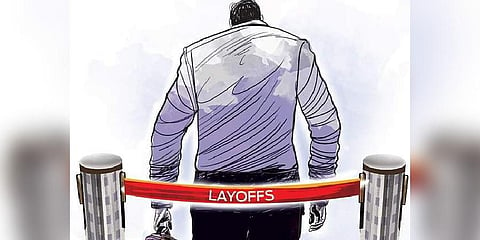US lawmakers write to USCIS on immigrants impacted by massive layoffs in tech industry
WASHINGTON: Expressing concern over the large-scale layoffs in the tech industry, a group of lawmakers from Silicon Valley has written to the US immigration agency to ensure that the highly-skilled immigrants on H-1B visas, the most sought-after by Indian IT professionals, can remain in the country even after losing their jobs.
Thousands of highly skilled foreign-born workers, including Indians, in the US, have lost their jobs due to the series of recent layoffs at companies like Google, Microsoft and Amazon.
According to US media reports, nearly 200,000 IT workers have been laid off since November last year. Industry insiders say that between 30 to 40 per cent of them are Indian IT professionals, a significant number of whom are on H-1B and L1 visas.
In their letter Ur Mendoza Jaddou, the Director of US Citizenship and Immigration Services (USCIS), the lawmakers noted that this group of immigrants possess skills that are highly valuable in today's knowledge-based economy and "forcing them to leave the US is harmful to our nation's long-term economic competitiveness."
The letter has been sent by Congressmen Zoe Lofgren, Ro Khanna, Jimmy Panetta and Kevin Mullin. Lofgren has been a former Chair of the House Subcommittee on Immigration and Citizenship.
"This issue is of great importance to our constituents because layoffs in the tech sector have accelerated in recent months. The number of tech jobs lost since the beginning of 2023 has already surpassed the total number of layoffs in 2022," the letter said.
It also requests that the USCIS release data detailing the impact of the layoffs on affected immigrants; inquire about whether the USCIS has issued guidance to adjudicators in response to the layoffs; and extend the 60-day grace period for laid-off H-1B holders to secure a new job before losing their legal status.
The H-1B visa is a non-immigrant visa that allows US companies to employ foreign workers in speciality occupations that require theoretical or technical expertise. Technology companies depend on it to hire tens of thousands of employees each year from countries like India and China.
The lawmakers asked the USCIS director to provide details of approximately how many H-1B visa holders have successfully maintained legal status after losing their jobs and how many have departed the country or accrued unlawful presence.
"We ask that you share any relevant data with us so we can better understand the impact of the layoffs," according to the letter.
"What are the approval and denial rates, broken down by visa category, for newly unemployed H-1B holders who have applied for the nonimmigrant visas listed in the December 19th USCIS fact sheet? Considering unemployed H-1B holders only have a limited 60-day window to secure a new visa, we request that you release this data publicly so these individuals can make informed decisions about which visas to apply for," it said.
The lawmakers asked approximately how long it takes for the USCIS to process visa applications submitted by newly unemployed H-1B holders.
"While individuals are legally allowed to remain in the US as their visa applications are pending, we're concerned about the potential consequences of processing times that exceed the 60-day grace period," the lawmakers said in their letter.
In such cases, immigrants will be required to depart the country immediately if their visa applications are denied, they said.
"This situation not only causes significant distress for the affected individuals but could also result in them accruing unlawful presence if it takes an extended period of time to get their affairs in order before departing the country. This could be held against them if they apply for a visa in the future," the lawmakers wrote.
The Congressmen asked why are newly unemployed H-1B holders penalised when applying for B-1/B-2 visitor visas. "Because B-1/B-2 visas are intended for short-term visits to the US, we are concerned that adjudicators will deny visas to laid-off H-1B holders, many of whom have lived in the US for years, on the grounds that these individuals do not have sufficient ties to their home countries to demonstrate that they intend to leave the US once their visas expire," they said.

